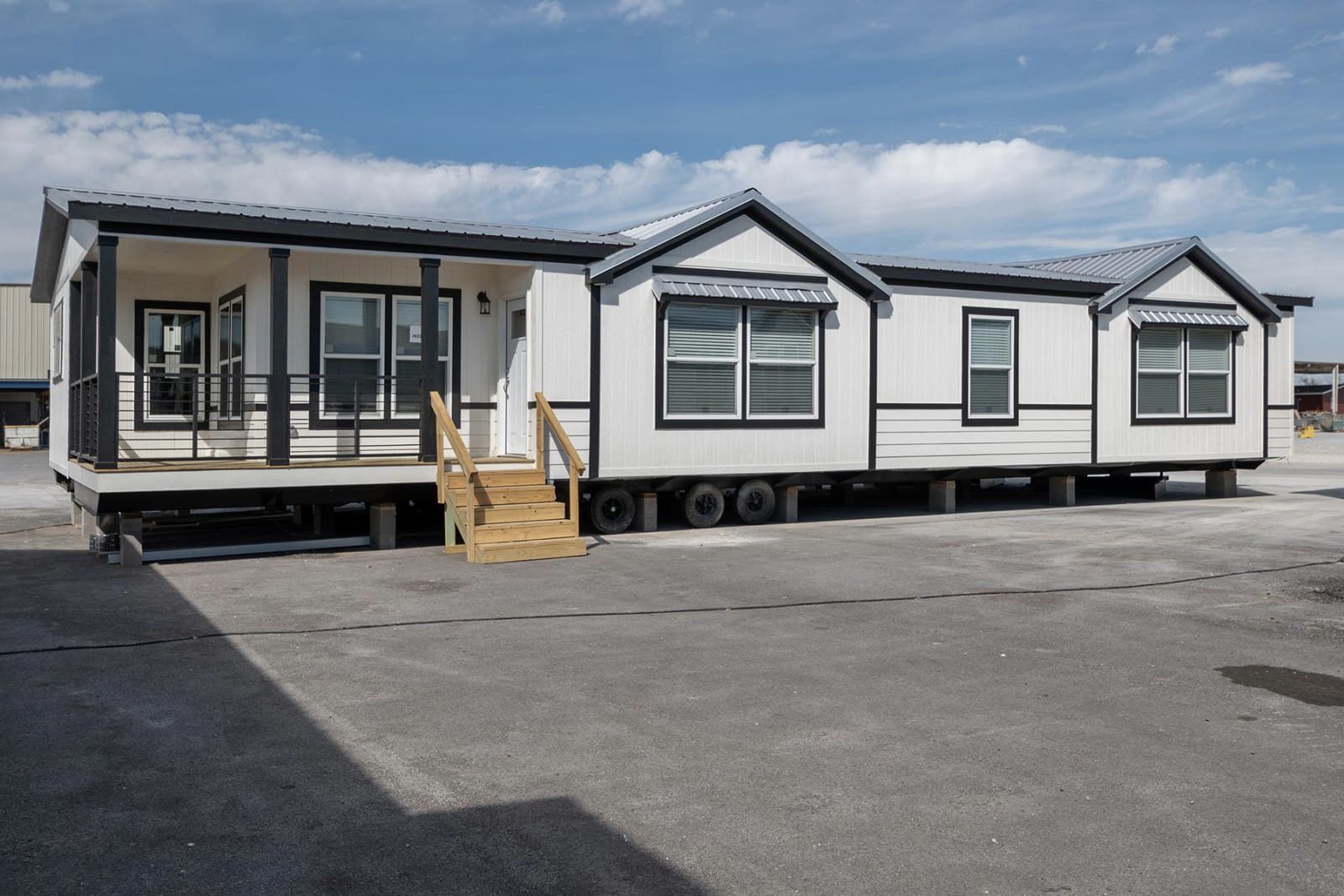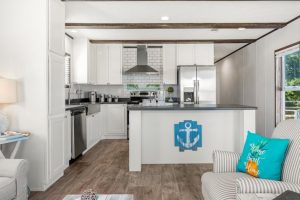The Pros and Cons of Owning a Mobile Home in New Braunfels
Mobile or manufactured homes are compact, customizable, and affordable housing [...]
Mobile or manufactured homes are compact, customizable, and affordable housing options. These homes are mass-produced in factories and are designed following the HUD standard, which ensures that each manufactured home meets the safety standards of American housing regulations.The manufactured home is put on a chassis, which further enables the homeowner to place them wherever they like, be it a mobile home park or their preferred land in the suburbs.
There’s no denying that mobile homes in New Braunfels are gaining a lot of attention and for the right reasons. The area is renowned for being home to many mobile home communities that offer brilliant shared amenities to the residents. Not only that, but mobile home parks are secure, serene, and convenient places to live with your families.
As exciting and affordable as these homes sound, they might not be the best fit for everyone. There are certain drawbacks you should be aware of before investing in a manufactured home in Texas. In this post, we’ve discussed the pros and cons of mobile home investment and some testimonials. Let’s take a look.
Pros of Mobile Home Ownership
More than 20 million Americans live in mobile homes. It’s the cheapest and fastest way to get home ownership. If you are also considering buying a mobile home, we’ve rounded up some pros that can help.
Affordability
Affordability is the biggest advantage of a mobile home and one of the many reasons that encourage Americans to invest in these properties. According to the New York Times, the average price of a new mobile home in 2022 was $127,300 while that of the single-family home was $430,808. The per-square-foot construction cost of mobile homes is cheaper than the homes built from the ground up, making them an affordable choice for aspiring homeowners.
Not just the construction cost, but the land where these homes sit is also reasonably priced. In most cases, homeowners buy the manufactured home and lease the land. Additionally, you get access to the community’s shared amenities, which may include swimming pools, fitness centers, parks, and parking facilities. Even a luxurious mobile home will cost you the same as a regular traditional home or lower than that, making it an excellent housing option for those who want home ownership but can’t afford the stick-built home.
Flexibility
As the name suggests, mobile homes are mobile, i.e. they can be transported from one location to another. They are built on the chassis, which can be moved and positioned on just about any piece of land. This gives you the flexibility of shifting your home to your desired location. If you are someone who moves frequently or you like the change of environment, you can have your mobile home moved to another location. Mobile homes also serve as a great temporary housing option for homeowners looking for an affordable, compact home that can accommodate their families until their stick-built, luxurious villas are ready.
Customizability is another factor that makes mobile homes flexible. Although you still have to deal with the size and space constraints, you get many customization options, including the ability to plan interiors and choose floors, furniture, fixtures, appliances, and other elements.
Community Living
Mobile home parks are located within communities that have lots designed specifically for these homes. Living in a community means you get access to shared amenities and a chance to socialize with members. You get to live with like-minded people without having to compromise on your privacy. If you like to socialize, community living is the best way to build your network and meet neighbors.
Many mobile home parks have a community of welcoming neighbors who are available for your support. You can host parties or let your kids play with their peers in the neighborhood. The biggest advantage of community living is accessibility to shared resources. Some luxury things that you might be unable to afford individually or don’t have enough space to have in your house can be easily accessed through these communities.
Energy Efficiency
The smaller size of the mobile home makes them more energy-efficient than their traditional stick-built counterparts. It’s obvious that the lesser the space, the lower the energy consumption, and the lower the utility bills. Besides, these homes are built following the HUD code. The components used in the manufacturing are sustainable and energy-efficient.
You can incorporate changes to make your mobile homes environment-friendly and energy-efficient. For instance, improving the insulation, choosing energy-efficient doors and windows, installing LED lighting, using programmable thermostats, and creating a smart home with energy-efficient appliances are a few tips that can help transform your house into an energy-efficient space.
Cons of Mobile Home Ownership
Not every American who lives in a manufactured home does it by their choice. Some buy a manufactured home because they are more affordable than stick-built houses. In the long run, mobile homes make a good choice for your residential needs but are not recommended for commercial or investment purposes.
Here are some common disadvantages of these homes.
Resale Value
The low resale value is the biggest disadvantage of a mobile home. Unlike traditional stick-built homes that appreciate over time, the value of a mobile home depreciates just like a recreational vehicle.
Another reason for its low resale value is the zoning regulation. This might pose restrictions in the placement of mobile homes. Besides, most of these homes do not sit on the property that’s owned by the mobile homeowner. Future home buyers might not want to invest in a property that sits on rented land, affecting its resale value.
Land Ownership
As mentioned above, mobile homes often sit on rented land. While you own the manufactured house, you might not have the land ownership. There’s no point in buying the land where you’ll place mobile homes, as you might want to move the home to another location in the future. The value of a stick-built home is comparatively higher than its mobile counterpart, as the land and property are inseparable.
Perception and Stigma
A mobile home can be designed to fit all your needs and living standards, but it will still be perceived as a less appealing choice for homeowners. There’s a stigma associated with the lifestyle in mobile homes, as they are small compared to traditional homes.
Limited Customization
Mobile homes offer limited customization options compared to traditional homes. The latter allows you to make any modification to the size, layout, interior and exterior decor, and other elements. Mobile homes, however, do not allow that level of flexibility. They are built in factories, which means construction elements used in these houses are not of your choice. Plus, you can’t customize the exteriors if you don’t have the land ownership. So, the interiors, windows and doors, and appliances are the only customizable options in a mobile home.
Maintenance and Upkeep
Mobile homes are constructed using cheaper materials. Since you don’t have much control over the quality of the construction material used, these homes require more upkeep compared to traditional homes. These materials tend to wear quickly over time and are more vulnerable to weathering than traditional homes.
Many people argue that mobile homes have fewer maintenance requirements because of their size and layouts, and the fact that they are built according to the HUD standard. Plus, the exteriors are maintained by the community, so that saves you significantly on the upkeep.
Limited Lifespan
Mobile homes are mass-produced in factories where there’s no guarantee of the quality of the materials used in construction. If poor-quality material is used, they will deteriorate quickly and your home’s resale value will drop substantially in no time. Mobile homes are constructed with materials that make these homes transportable and easy to assemble and disassemble. So, their mobility might be a disadvantage for some homeowners. As a result, these homes have a comparatively shorter lifespan than traditional homes.
Real Stories and Testimonials
Laurie M. owns a mobile home in Oregon and she believes nobody can guess that their home is not the regular stick-built type. She has expanded the closet and has customized and resized the rooms to ensure they fit her living standards.
Stephan Gardner is another mobile home owner, who moved from a rented property to a mobile home. He mentioned how amazing it felt moving into the house after paying $2100 in rent every month.
An LA resident said that a mobile home was their only way to afford their own home in Los Angeles that came with a parking facility, a yard, and sufficient space.
Conclusion
Owning a mobile home in New Braunfels is a great decision for homeowners planning to move into a customizable, flexible, and affordable living space. With so many mobile home communities and tons of upcoming projects, there are countless options (in terms of location) for you to choose from. However, it’s important to weigh the pros and cons of living in mobile homes before moving into this compact space. Read the above benefits and drawbacks of these communities before making a decision.


